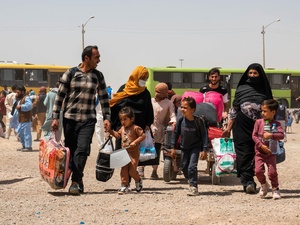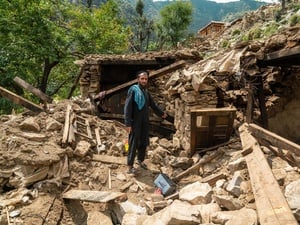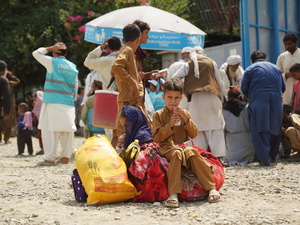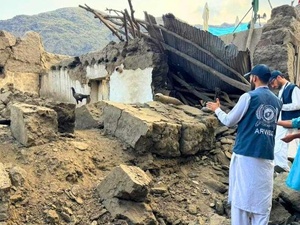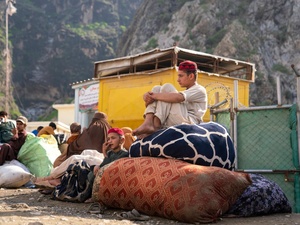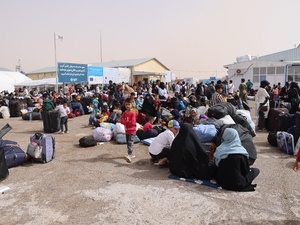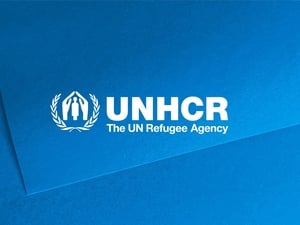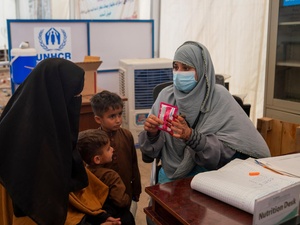Afghanistan, Pakistan and UNHCR agree to closure of three refugee camps
Afghanistan, Pakistan and UNHCR agree to closure of three refugee camps

Girdi Jungle, located near Iran and Afghanistan in Pakistan's Baluchistan province, is one of three refugee camps due to close in July.
GENEVA, June 1 (UNHCR) - Afghanistan, Pakistan and the UN refugee agency agreed at a recent meeting in Qatar on the closure of three refugee camps in Pakistan and pledged to step up their efforts to find solutions for 2.6 million Afghan refugees still left in Pakistan.
The decisions came at the 10th meeting on May 30-31 of their tripartite commission on the voluntary repatriation of Afghan refugees.
"We welcome the Government of Pakistan's decision to close three camps, Girdi Jungle and Pir Alizai in Baluchistan and Kacha Gari in North-West Frontier Province by the end of July," UNHCR's top representative at the meeting, Ekber Menemencioglu, said. "We are especially grateful for its commitment to closely coordinate the closure and consolidation process with UNHCR and the Government of Afghanistan."
The three camps are due to close next month as part of a Pakistani plan for camp closures and repatriations over the next three years. The meeting agreed that closure of Jalozai Camp in North-West Frontier Province would be put back until next year.
Since 2002, more than 4.5 million Afghans have returned home, 3 million from Pakistan. So far this year, some 62,000 Afghans have returned home from Pakistan, 96 percent of them with UNHCR's assistance. This suggests another substantial repatriation season is in prospect. The voluntary repatriation operation is the largest in UNHCR's history and is regarded as one of the major achievements of Afghanistan's reconstruction process over the past five years.
However, UNHCR estimates that some 2.6 million Afghans still remain in Pakistan. Describing the return of these people as "a sharp challenge," Menemencioglu noted that many had lived in Pakistan for more than 20 years, half were under the age of eighteen, and many originated from insecure or underdeveloped areas in Afghanistan.
Menemencioglu said Pakistan's National Database and Registration Authority, with the help of the UNHCR and Afghanistan, would later this year conduct a US$6 million registration exercise of Afghans in Pakistan. "It will provide the governments of Afghanistan and Pakistan, and UNHCR, with important data to develop policies for voluntary repatriation, for reintegration, and for the future management of this population," he added.
The UNHCR representative also said he was encouraged by Afghanistan's agreement to prepare a strategy for reintegration that will complement the three-year Pakistani plan for camp closures and repatriation. The Afghan plan includes land distribution schemes and the establishment of new townships.
At the Qatar meeting, UNHCR officials also noted that the Afghanistan National Development Strategy - a blueprint for reconstruction and development - contained a number of programmes addressing reintegration challenges.
Menemencioglu said UNHCR believed a "comprehensive approach was necessary to tackle all aspects of this protracted refugee situation." To that end, he said, the UNHCR had introduced proposals for new return and reintegration arrangements, including an increased cash allowance for returnees to sustain the future momentum of repatriation.
However, Menemencioglu underlined that generating the necessary resources would require high-level political commitment from all parties. UNHCR thus welcomed a planned ministerial-level conference of the Organisation of Islamic Conference in Islamabad this November as it would afford a good opportunity for Afghanistan and Pakistan to win support for solutions to the refugee problem.
The UNHCR official said the Qatar talks were also very constructive for future planning, with further consultations on repatriation and reintegration plans now scheduled to take place before the next tripartite meeting in late August.


